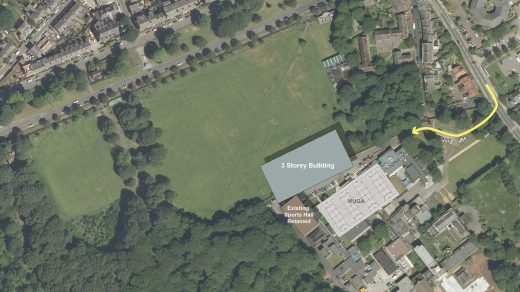Careers explored: Mental health matters

As a nation, we are talking more openly about mental health. The stigma that was once attached has diminished rapidly thanks to national and world-wide campaigns which have encouraged us all to speak up. With members of the royal family, celebrities and athletes speaking about their own struggles, seeking help is now much more accessible.
The mental health sector is expanding and providing the right care is vital. According to the NHS Mental Health Implementation Plan, the health service wants to grow its workforce by more than 27,000 people by 2023/24.
A career in this field can help some of the most vulnerable adults and children in society. Whether it is psychiatry, nursing or counselling, every role plays a key part in ensuring individuals get the right mental health treatment at the right time.
Psychiatry is concerned with the diagnosis, treatment and prevention of mental health conditions.
Unlike other mental health professionals, such as psychologists and counsellors, psychiatrists must be medically qualified doctors who have chosen to specialise in psychiatry. This means they can prescribe medication as well as recommend other forms of treatment for patients.
The pathway into this career is lengthy and you must have completed a five-year degree in medicine, a two-year foundation programme of general training, three years of core training in psychiatry and three years of training in a speciality.

The average starting salary is over £28,000 and there are a number of areas you can specialise in, including general adult, child and adolescent, old age, forensic, psychiatry of intellectual disability and medial psychotherapy.
A clinical psychologist aims to reduce the distress and improve the psychological wellbeing of individuals who may have a variety of mental or physical health conditions. To become a clinical psychologist, you must be registered with the Health and Care Professions Council (HCPC) to work as a clinical psychologist. This involves completing three years of postgraduate training leading to a Doctorate in clinical psychology, or equivalent, approved by the HCPC.
You’ll also need Graduate Basis for Chartered Membership (GBC) to get a place on a Doctorate course, which is achieved by completing a psychology degree or conversion course accredited by The British Psychological Society (BPS). The average starting salary is over £30,000.
Alternatively, there are many other careers in which you can help support the mental health of others. Liverpool John Moores University (LJMU) offers a dedicated course for mental health nursing which gives students the experience to learn from a team of vastly experienced mental health professionals from each type of clinical area within mental health care.
Dean McShane is a mental health senior lecturer at LJMU, he said: “Mental health nursing has always been a popular course as it is an occupation but more and more students are enrolling due to being inspired and wanting to become part of the caring profession themselves.
“The course is very popular but the numbers are managed by the NHS and their requirements. As a university, we offer two intakes a year for the mental health nursing programme. When we reach capacity for September intakes, we have the luxury of being able to offer candidates the chance to enrol in a January intake.”
Dean added: “The programme is based on 50% theory, which covers the academic part of the programme and 50% practice, in which students get to experience clinical placements from ward environments to community-based placements.
“The programme covers all aspects of mental health care, all ages and various client groups (from child and adolescent to older adults and dementia care), diagnosis, services, treatments and the NMC requirements and competencies that the students must achieve to qualify at the end of three years. We also offer and encourage various extracurricular activities such as Nursing Society events, research opportunities, student quality ambassador programmes and local community engagement.”
The average starting salary for a mental health nurse is around £24,000.

Alternatively, you could study to become a therapist. Therapists are mental health professionals who are trained to listen to a person’s problems to try to find out what’s causing them and help them find a solution.
Edge Hill University offers a BA (Hons) Counselling and Psychotherapy course where you can develop in-depth knowledge and clinical capabilities as you train to become a highly effective therapist.
The university also has a BSc (Hons) Critical Approaches to Counselling and Psychotherapy course which offers a broader context and examines the many modalities and political context of counselling, as well as exploring how it can promote social justice and urge communities to take action.
Educate spoke to Carol Wilson, associate head of Applied Health & Social Care at Edge Hill University to find out more. She said: “Our teaching team is made up of counsellors and psychotherapists with extensive experience in their individual and specialised fields. We’ll help students to explore the theories and philosophies that shape practice, provide practice experience and enable students to make the essential link between theory and becoming an effective practitioner/employee.”
Professional development is key. On both programmes, Edge Hill University financially supports individual therapy, and in the BA, they also financially support external supervision in second and third year to help students process their actions when dealing with their own clients.
This year, both courses have seen an increase in applicants. Carol said: “In 2021, we received nearly 500 applications.
“The economic and social cost of mental ill health has grown in the last 10 years and is estimated to cost the English economy around £119 billion per year. It can arise from a combination of factors and individuals living with mental health issues may require support from a range of services such as housing, social enterprise and community organisations as well as statutory health and social care services.
“Human relationships are at the heart of almost every aspect of our personal and working lives. That is why it is vital that there are knowledgeable practitioners to fill roles that will help to reduce the stigma, disadvantage and inequality experience by children, young people and adults living with mental health issues, to work within communities to promote good mental health and wellbeing.”
Students can expect to go on to support people through tough times as counsellors, work as person-centred experiential therapists or stay in education with postgraduate study.

Carol added: “Our graduates stand out to employers, with 100 per cent of our counselling graduates in employment or further study 15 months after graduating. Whatever their ambition, they will be ready to work across a variety of settings, from hospices to charities, prisons to private healthcare.”
The average starting salary for a counsellor is around £20,000 and for trainee psychotherapists in the NHS it is upwards of £30,000.
Christina Searson is a second-year student on the Critical Approaches to Counselling and Psychotherapy course. She is a young carer who looks after her mum.
She said: “I’ve got a lot of first-hand experience of how mental health services work and the effects that mental health issues can have on people’s lives. That was my main inspiration to go into the field of mental health and once I started researching it, I found it fascinating. I’m really interested in how the brain works, and how the brains of people with mental health problems may be different.”
Speaking about the course, she said: “There’s a real focus on personal development on the degree – you get to learn a lot about yourself. I think it’s amazing that your growth as a person is an integral part of the course. You might have to change things about yourself to be the best practitioner you can be, so finding out about yourself really helps when you’re trying to get others to understand themselves. It’s almost like getting free counselling. I’ve discovered so much about who I am through personal development.”
Once she graduates, Christina would like to work with young people’s mental health. She explained: “Young people’s minds are so interesting and mental health is such an important topic at the moment. If you can discover mental health problems early you can prevent people suffering with serious mental health issues in adulthood. A lot of children slip through the net and by the time they do get help, they can be really unwell people. If you can change a child’s life, that’s one of the greatest things you could probably do.”
As mental health is a such a broad area, Dean McShane offers some key advice: “Make sure that it is the career for you, complete some volunteering work or paid employment within mental health care to discover the clinical area that you are most passionate about.”
For expert careers guidance, Liverpool City Region Careers Hub has recently launched the Creating Careers programme, which is an employer led video series to inspire and inform young people. Creating Careers features over 60 different job roles across ten sectors, including construction, creative industries through to health and life sciences, maritime and the visitor economy.
Lesleyann Craig, Liverpool City Region Careers Hub Enterprise Coordinator at Growth Platform said: “Our Creating Careers programme can support students on their journey to finding a rewarding career in mental health. Not only do we have on-demand episodes featuring careers such as psychological wellbeing practitioners and criminal justice liaison and diversion, each episode comes with pre and post work to support students’ understanding of the subject.
“In addition, Creating Careers: Ask Us Anything are running a live, virtual Mental Health and Psychological Careers event on Thursday 7 October 2021, 9.30 am – 11.30 am, for students Year 9+. This is a valuable opportunity to meet industry professionals and students and learn more about careers in mental health.”
For more information email
Entry requirements for BsC Mental Health Nursing at LJMU
112 UCAS Tariff points:
• A level: BBC
• BTEC Level 3 National Extended Diploma – Distinction, Merit, Merit (DMM)
Applicants must hold grade 4 or grade C or above in English language and mathematics GCSE or an approved alternative qualification.
Link to course: www.ljmu.ac.uk/study/courses/undergraduates/2021/mental-health-nursing
Entry requirements for BA Hons Counselling and Psychotherapy at Edge Hill University
104-112 UCAS Tariff points:
• A Level: BCC-BBC
• BTEC Extended Diploma (or combination of BTEC QCF qualifications): Distinction, Merit, Merit (DMM)
• T Level: Education and Childcare T Level with an overall grade of Merit
Entry requirements for BSc (Hons) Critical Approaches to Counselling & Psychotherapy
104-112 UCAS Tariff points:
• A Level: BCC-BBC
• BTEC Extended Diploma (or combination of BTEC QCF qualifications): Distinction, Merit, Merit (DMM)
• T Level: Education and Childcare T Level with an overall grade of Merit
Link to Edge Hill courses: ehu.ac.uk/studymentalhealth




